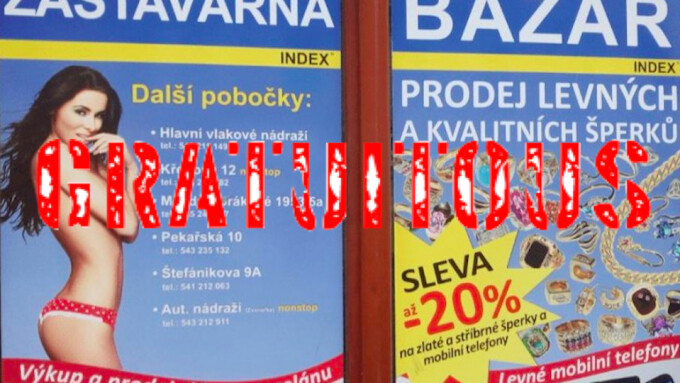BRNO, Czech Republic — The Czech Supreme Administrative Court (NSS) ruled last month that the “gratuitous” use of images of the naked or “almost naked” female body in advertising for unrelated products constitutes discrimination in the Central European country.
The NSS — the Czech Republic’s highest appeals court for non-criminal matters — thus upheld a fine against pawn shop firm Index Cechy by the regional Trade Licensing Office of South Moravia, according to a report by journalist Raymond Johnston for the Expats.cz news site.
Colorful ads and flyers by Index Cechy for their shops typically featured pawnable merchandise on one side and scantily clad models on the other.
Female Nudity is 'Degrading to Human Dignity'
According to the South Moravia Trade Licensing Office, Johnston reported, “one side of the leaflet has photos of pawnshop goods such as jewelry and electronics, and advertising messages with addresses of establishments and information about the quality of goods, prices and the possibility of paying in installments. The other side of the leaflet there is a frontal photograph of an almost naked young woman posing only in panties, with her breasts fully exposed, leaning on the body of a historic car.”
Back in 2016, the South Moravia Trade Licensing Office imposed a CZK 50,000 fine (around $2,400 at current exchange rates) on Brno-based Index Cechy for “discrimination” based on the country’s advertising law. The company lost all their appeals with the Ministry of Industry and Trade and the Regional Court. A few weeks ago, the NSS definitively “found that using an image of a naked woman simply to draw attention to unrelated goods places objectifies women, which is contrary to good morals and discriminatory against the female sex, as well as degrading to human dignity,” Expat.cz reported.
Consensual Nudity Targeted by 'Progressive' Group
The ruling was celebrated by a “progressive” organization called Nesehnutí, which bills itself as an “independent social ecological movement.”
Nesehnutí conducts regular campaigns against what their members consider “sexist” and lobbies for legislation that helps them target advertising such as the Index Cechy ads.
The group garners media attention by holding the Sexist Piglet (Sexistické prasáte?ko) mock awards, where they denounce companies for their advertising campaigns.
“We started our campaign against sexist advertising in 2009,” Neshnutí proclaimed last week on their Facebook page, gloating over the NSS’ Index Cechy decision. “At that time, almost no one even knew the concept of sexism, and many people confused it with sex for a long time.”
"It has been 12 years and the term sexist advertising is used by the Supreme Administrative Court,” they added with pride.
Neshnutí also quoted the NSS ruling, which declared that in the Czech Republic depictions of “almost naked” women “reduce [her] human dignity” and “reduces the woman to a mere sexual object,” regardless of the consent, willingness or feelings of the model in question.
Since “the advertisement offended people with ordinary moral feelings,” the court continued, “it is unacceptable for a young woman to be portrayed in this way (i.e., almost naked) in a pawnshop advertisement.”
“Advertising not only reflects social reality, but also has the ability to shape and shape it, so it is important that it does not present socially undesirable phenomena,” the Czech Supreme Court concluded.






